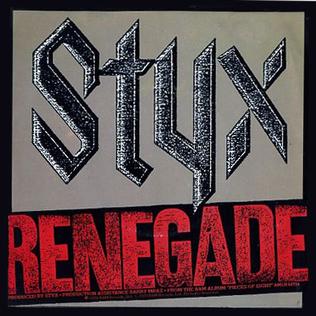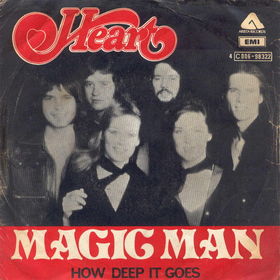
Equinox is the fifth studio album by American rock band Styx, released in December 1975. The lead single "Lorelei" became Styx's second US Top 40 hit.

Edge of the Century is the twelfth studio album by Styx, released in 1990 on A&M Records. It was the first Styx album featuring A&M solo artist Glen Burtnik and the final album to feature drummer John Panozzo before his death in 1996. It is also their final album to be released on A&M Records.

"Mr. Roboto" is a song by American rock band Styx, released as the lead single from their eleventh studio album, Kilroy Was Here (1983). It was written by band member Dennis DeYoung. In Canada, it went to #1 on the RPM national singles chart. It entered on both the US Billboard Hot 100 and US CashBox Top 100 on February 12,1983. On April 30 the song peaked at #3 on Billboard,but fared better on Cash Box, where it reached #1.

Paradise Theatre is the tenth studio album by American rock band Styx, released on January 16, 1981, by A&M Records. It was the band's most commercially successful album, peaking at #1 for 3 weeks on the Billboard 200 in April and May 1981 (non-consecutively). It was also the band's fourth consecutive album to be certified triple-platinum by the RIAA.

Caught in the Act is a live double album by Styx, released in 1984. It contains one new song, "Music Time," which was released as a single, reaching #40 on the Billboard Hot 100 charts.

"Come Sail Away" is a song by American pop-rock group Styx, written and sung by singer and songwriter Dennis DeYoung and featured on the band's seventh album The Grand Illusion (1977). Upon its release as the lead single from the album, "Come Sail Away" peaked at #8 in January 1978 on the Billboard Hot 100, and helped The Grand Illusion achieve multi-platinum sales in 1978. It is one of the biggest hits of Styx's career.

"Renegade" is a 1979 hit song recorded by the American rock band Styx on their Pieces of Eight album. Although songwriter Tommy Shaw and fellow Styx guitarist James Young usually played lead guitar on their own compositions, Shaw asked Young if he could take the solo on "Renegade". Young agreed, and Young later returned the favor by allowing Shaw to play lead on his "Half-Penny, Two-Penny" on the Paradise Theatre album. When performed live from 1978 to 1983, drummer John Panozzo increased the tempo of the drum pattern during the guitar solo sections. Also, the track would serve as the drum solo spot for Panozzo during that time frame.

"Lady" is a 1973 power ballad written and performed by the rock band Styx. It was first released on Styx II and was a local hit in the band's native Chicago, but initially failed to chart nationally. The song gained success shortly after Styx left Wooden Nickel Records to move to A&M Records in 1974 as it began picking up airplay nationwide, eventually peaking at #6 on the Billboard Hot 100 in March 1975. The power ballad was later re-recorded for the 1995 Styx compilation Greatest Hits due to a contractual dispute between A&M and Wooden Nickel.

"Magic Man" is a song by the American rock band Heart released as a single off their debut album, Dreamboat Annie. Written and composed by Ann and Nancy Wilson, the song is sung from the viewpoint of a young girl who is being seduced by an older man, much to the chagrin of her mother, who calls and begs the girl to come home. In an interview, Ann Wilson revealed that the "Magic Man" was her then boyfriend, band manager Michael Fisher, and that part of the song was an autobiographical tale of the beginnings of their relationship. Roger Fisher came up with the alternative tuning EADGDG for his guitar part. The album version of "Magic Man" features an over-two-minute instrumental break which consists of a guitar solo and the usage of a Minimoog synthesizer, while the single version of the song edits out most of this break, cutting it down from 5:28 to 3:29.

"Babe" is a song by the American rock band Styx. It was the lead single from the band's 1979 triple-platinum album Cornerstone. The song was Styx's first, and only, US number-one single, spending two weeks at No. 1 in December 1979, serving as the penultimate number-one single of the 1970s. "Babe" also went to No. 9 on the Adult Contemporary chart. It additionally held the number-one spot for six weeks on the Canadian RPM national singles chart, charting in December 1979 and becoming the opening chart-topper of the 1980s. It was also the band's only UK Top 40 hit, peaking at No. 6. It also reached No. 1 in South Africa.

"Don't Let It End" is the third track and the second top 10 single on the 1983 album Kilroy Was Here, by Styx. The song is also reprised at the end of the album.
"Best Thing" is the first single released by the band Styx from their self-titled debut album, Styx (1972). It charted at #82 on the Billboard Hot 100.
"You Need Love" is a song by Styx written by Dennis DeYoung. Following the success of the 1974 re-release of the single "Lady" from the album Styx II, "You Need Love" from that album was released as a follow-up single.

"Lorelei" is a song from rock band Styx. It is on their 1975 album Equinox, and was released as a single in 1976.

"Fooling Yourself (The Angry Young Man)" is the second single released from Styx's The Grand Illusion (1977) album. On the Billboard Hot 100 pop chart in the U.S., the single peaked at #29 in April 1978. It also hit no. 20 on the Canada RPM Top Singles chart the week of May 6, 1978.

"Blue Collar Man (Long Nights)" is a song by American rock band Styx, released as the first single from their eighth studio album, Pieces of Eight (1978). Released in 1978, the single came in two 7" vinyl formats: one with the b-side "Superstars" (a track from The Grand Illusion) and a second single with the instrumental album track "Aku-Aku" as the b-side. Some printings of the single were also issued in a translucent blue vinyl, which are now highly sought after collectors items.

"Sing for the Day'" is the second single that Styx released from their album Pieces of Eight. It reached #41 on the U.S. Billboard Hot 100 pop singles chart in February 1979. It was later the B-side of their next single “Renegade”. Tommy Shaw used the name ‘Hannah’ in the song, to represent his fans. Several years later, he named his newborn daughter Hannah. The album version that lasts 4:57, was edited down to 3:40 for the single version.

"Why Me" is a song written by Dennis DeYoung that was first released on Styx's 1979 double-platinum album Cornerstone. It was also released as the second single from the album, and reached #26 on the Billboard Hot 100 and #10 on the Canada RPM Top 100 Singles chart.

"The Best of Times" is a song by American rock band Styx, released as the first single from their tenth album Paradise Theatre. It reached No. 1 in Canada on the RPM national singles chart, their second chart-topper in that country, and No. 3 on the US Billboard Hot 100 for four weeks in March and April 1981. In the UK, the song peaked at No. 42 on the UK Singles Chart.

"Show Me the Way" is a song by American rock band Styx, written by Dennis DeYoung and released as the second single from Edge of the Century. It peaked at number 3 on the Billboard Hot 100 chart in March 1991. The song's music video was directed by Michael Bay.

















